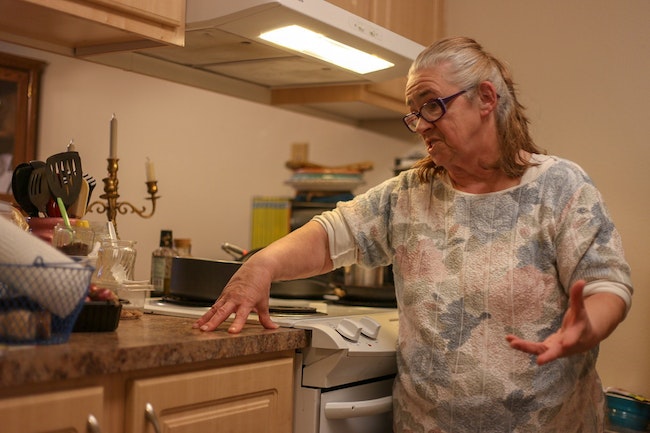
Vickie Rogers talks in her Salem apartment on an early November morning. (Troy Brynelson/Salem Reporter)
Vickie Rogers has lived with an intellectual disability all her life, slowing her thoughts and speech. But she’ll tell you it can’t slow the crusader in her.
She avoids conflict, the 65-year-old said, but she’ll fight to protect others. It’s an instinct she proudly ascribes to Gaelic ancestors.
Rogers’ will to stand up was tested throughout this year as she battled an ex-landlord to recover her security deposit. The tug-of-war has already been decided in court — but it’s not quite over.
“I have Crusader blood in me,” she says, recessed into a sofa on a recent morning while keeping a hand on her aging dog, Ruby. “If I can help someone who is being picked on, I can be very assertive.”
She hopes to be an example for others in the same circumstance.
While disputes between landlords and tenants happen every day, they carry extra weight if the tenant is disabled, makes little money and relies on taxpayer-funded housing.
Rogers has children who live in Marion County, as well as aid workers who help her weekly. Otherwise, aides say, her situation could have turned out worse.
“If she didn’t have any advocates, she’d be on the streets,” said Kelly Haider of Valley Mental Health, who has worked with Rogers for three years.
Rogers wears purple-rimmed glasses and keeps long graying hair pulled back. Quilts and blankets lie around her apartment in north Salem. She talks as though she’s never been in a hurry, but her tone can quickly turn to a rush of anxiety.
Rogers spent much of her life between Salem and southwest Washington. She can happily tell about genealogy and religious history for hours — hence her fascination with her own “Crusader blood.”
Still, medical records she provided show that she’s been diagnosed with post-traumatic stress disorder and an intellectual disability. The records show she spent time in foster care as a child. She wasn’t diagnosed with a disability until 2016 — when she was 62.
“Everybody who’s met my mom knows she’s different after a few minutes of talking to her, but when I was a kid, welfare was the only option,” said her son, Barret Rogers, 44. “The system back when I was a kid was not really set up to deal with people like my mom.”
She rarely held a job, her son said, and the family of three sometimes slept on others’ couches. By the time her son and daughter each reached high school, they moved into the care of other family members.
An engineer in Salem, Barret Rogers said his mom’s independent streak keeps her from asking her children for much money.
“Her dog needed eye medicine a month or so ago and that was $100 she just didn’t have,” Rogers said. “Those are the kinds of things she reaches out to us for.”
For many years, rental assistance and other social services were far from her mind, he added. But her recent diagnoses helped qualify her for subsidized housing.
She hoped to live in Salem, where her children live, but the tighter market there landed her on a waitlist. In the meantime, she took a room at Stayton Manor, a subsidized housing complex for seniors. She lived there nearly two years.
 Vickie Rogers holds her dog, Ruby, on an early November morning (Troy Brynelson/Salem Reporter)
Vickie Rogers holds her dog, Ruby, on an early November morning (Troy Brynelson/Salem Reporter)
When a Salem room became available in December, Rogers notified Stayton Manor she would pay her January rent. Her aides and her children helped her clean the apartment before she left that month.
Weeks after leaving, Rogers and Haider said they called and faxed her landlord, St. Vincent de Paul of Lane County, asking for her $211 security deposit.
Fast-forward to April 24, when Rogers got a letter. St. Vincent de Paul billed her $320.87. That included $126 for “general cleaning,” $126 to repaint the apartment, $18.70 to clean and replace window covers and another $50.17 for February rent.
The nonprofit notified her it would apply her security deposit, but still need another $109.87.
After paying her for cell phone, medication, utilities, household supplies and groceries that are not covered by food stamps, Rogers rarely has $50 left each month, according to Haider.
“She has to budget everything,” Haider said.
Rogers remembered being frustrated with the letter.
“I said ‘what the beep is going on here?’” Rogers said. “This was, how do you say, one straw too many. I took it to Kelly and she said ‘Oh no.’”
Rogers and her aides sent a letter disputing the charges, with photos of the apartment’s condition when she left, and disputed the charge for February rent.
They also raised a legal point: landlords in Oregon must inform ex-tenants within 31 days of the move-out what will happen to their security deposit.
“It is my belief that the notice was created in response to my request for the return of my security deposit and is retaliatory in nature,” Rogers wrote to St. Vincent de Paul, in a letter helped by Haider, on May 21.
St. Vincent de Paul’s staff wrote back, saying Rogers failed to comply with policies requiring a former tenant to dispute the security deposit letter within 10 days.
“We are sorry to inform you that due to not receiving your letter in the designated time frame the balance of $109.87 is still due,” a staffer wrote.
A collection agency then appeared. On July 15, the company Professional Credit Service sent a letter to Rogers asking for the funds plus a small interest charge.
Three days later, Rogers filed a small claims case in Marion County Circuit Court. She sought $516, contending that Oregon law entitled her to recover double the security deposit plus court fees.
“I was a little nervous,” Rogers said. “Not because I did anything wrong. Like, when you’re in school and going to the principal’s office and you didn’t do anything.”
St. Vincent de Paul never responded to the claim. In September, the court awarded Rogers a default judgment for $573 total, according to court records.
The money still hasn’t arrived, however. Haider said she has called twice. Records show the court notified St. Vincent de Paul on Sept. 18.
After being contacted Tuesday by Salem Reporter, the nonprofit said it plans to pay the $573 owed.
Terry McDonald, the nonprofit’s executive director, said Tuesday that the nonprofit didn’t know about the court judgment. He and another staffer said they were under the impression the courts denied the claim.
“We certainly are apologetic on this one and we’ll get this paid as soon as possible,” he said. “We’re not in the business of making people miserable. I’m appalled that we got to this position.”
Rogers has been in her new apartment for 10 months. She said she was happy to get the win and looked forward to collecting the money that has yet to arrive.
“With them, I’m not holding my breath,” Rogers said.
Have a tip? Contact reporter Troy Brynelson at 503-575-9930, [email protected] or @TroyWB.









